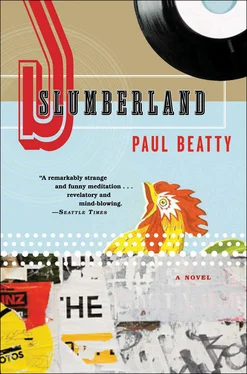“Stolen Moments” is Oliver Nelson’s signature tune, a song I find to be the ultimate mood setter; it’s a classic jazz aperitif. Oftentimes, when I play hardcore underground hip-hop or punk gigs, after three or four especially rambunctious tunes the mosh pits begin to resemble the skirmish lines of a Bronze Age battle-field, the warehouse windows start to shake, the record needle starts to skip, the women have that “I’m down with the pogrom” whatever-motherfucker look in their eyes, and I know the party is one more Wu Tang killa bee sting or Bad Brains power chord from turning into Attica, I play fifteen to twenty seconds of “Stolen Moments” to ease the tension, keep the peace. Its incongruous beauty brings about the wry existential lugubriousness of the Christmas Eve carol coming from the enemy encampment on the other side of the fog-covered river in a hackneyed war movie. “Stolen Moments” is that type of intrusion, a lull in the fighting, a time to finish that drink and forgive and forget. The people know I’m providing a respite from the real by granting them a temporary gubernatorial death-row reprieve before I hit them with the next piercing Mobb Deep fuck-you falsetto, Bounty Killer lick shot, or soul-splitting, pre-sellout, angst-ridden, Biohazard scream.
I knew immediately that “Stolen Moments” would be the Slumberland’s signature tune; a smooth midtempo song, it would provide a sticky, almost humid, languorous background to an already sexually charged atmosphere. If a female failed to become aroused by a Tanzanian peacock unfurling his tail feathers, it’d bring out the pavonine sheen of his olive-green polyester slacks, burgundy silk shirt, and tan patent leather shoes. When the middle-aged West Berlin lioness slinks about the place flicking her feather cut and stalking her prey, Dolphy’s flute would gently lift both her sagging breasts and spirits, Paul Chambers’s bass would enhance her rear end with some downtown Detroit rotundity, and Bill Evans’s piano would unaccent her English, put words in her mouth that she didn’t know she knew and make her immune to egotistical black-male bullshit. Maybe one day Doris, while stocking bar, would hear the song and forgive me for stealing her moments. I know the song has yet to be written that would allow me to forgive myself.
The schoolboy dotted the exclamation point, and I thanked him. “ Ausländer raus! ” never sounded so beautiful. I went back inside to finish my beer and watch the sun erase his slur.
GERMAN BARS DON’T have happy hours. They have hubris hours. There is no designated time for hubris hour. It happens unexpectedly and without warning. The bartender doesn’t ring a bell at five P.M., announce that for the next two hours drinks are two for one, and that sage advice and unmitigated superciliousness are on the house. In fact, the only way I can tell when it’s hubris hour is by the look on Lars Papenfuss’s face.
Lars Papenfuss is Doris’s new boyfriend and my best friend. We met about two weeks after the unveiling of the jukebox. He’s a freelance journalist. A master spy who uses his cover as a pop-culture critic to prop up dictatorial movements like “trip-hop,” “jungle,” “Dogme 95,” and “graffiti art” instead of puppet third-world governments. He’s assassinated more visionaries than the CIA, but when we first met he was eager to come in out of the cold.
“Why are looking at me like that?” he asked.
“Because you look funny.”
“How do I look?”
“You look proud.”
“Then indeed I do look funny.”
I’d seen that self-satisfied smirk on a German face only once before. CitySports Bar was open until the wee hours of the morning so the Charlottenburg locals could watch Graciano Rocchigiani fight for the light-heavyweight title in Las Vegas. These storied German boxers never fight outside of Germany and are rarely even German, but “Rocky,” as his countrymen lovingly called him, wasn’t an adopted Pole or gargantuan Ukrainian, and that night the native Berliner beat a potbellied black man senseless in the Las Vegas heat. In the sixth round when the referee’s count reached ten and the American slumped into the arms of his cornermen, the fight fan next to me, Heiko Zollner from Wilmersdorf, swelled with a smug patriotism that his German guilt wouldn’t allow him to express. He wanted to say, “I’m proud to be German” but he couldn’t, it’s illegal. Even the slightly less salacious “I’m happy to be German” would’ve compelled him to turn himself in to the authorities, whereupon he would’ve been sentenced to six months probation and a hefty fine and required to recite the first fifteen lines of the kaddish in Hebrew or French kiss a leper.
After the fight Heiko and I drunkenly reenacted the bout over a frothy pitcher of beer. With the orange peels we’d stuffed into our mouths serving as mouthpieces, our hands cut through the stream rising from a stainless steel bin of freshly hard-boiled eggs. When we finally tired, Heiko, no longer able to contain his German pride over Rocky’s victory, raised a goldenrod mug of Bitburger beer brewed and poured to print-ad perfection. He pounded on the table. “Wie glücklich bin ich doch über dieses wunderschöne Bier heute morgen zum Frühstück,” he exclaimed. How fortunate I am to be able to partake in this beautiful glass of beer for my morning repast . That was all the displaced praise his champion and country would get.
Lars looked just like Heiko did that night. His face lit up with that same hubris-hour smirk. He ordered a round of drinks and stuck out a hairy hand. He was there to interview me. I’d seen him around. Sitting at a corner table by himself, drinking his wine and observing. Every now and then he’d walk over to the jukebox, put his hands on the glass, and peer into the machine like a mechanic listening to an engine.
He’d done a lot of record promotion disguised as objective music journalism for a record company headquartered in Berlin. Doris was tending bar at a meet-and-greet for an American boy band when he asked her to make him something different and if she’d heard any good music lately. She mixed him an Adios Motherfucker,* then offhandedly mentioned the Slumberland jukebox. Told him the bar’s patrons were so impressed by the jukebox selection that two or three times a night the place would go quiet for minutes at a time, that it wasn’t a rare occurrence for newcomers to get shushed for talking over Charles Brown’s “Drifting Blues” or for the crowd to applaud some particularly adroit Jackie McLean solo.
Intrigued, Lars had shown up once or twice the week prior to research his story by standing in the machine’s opalescent glow and pressing his nose against the glass.
I consented to the interview so long as he promised that he wouldn’t print my name or the name of the bar in the article, and, most important, that he wouldn’t tell any of his fellow hacks about the place. Nothing ruins a good thing like its discovery by aging rock ’n’ roll critics looking for a scene.
While Lars fumbled with his old-fashioned cassette recorder, I took out my minirecorder and placed it on the bar, answering the why-the-fuck-don’t-you-trust-me look on his face by explaining that I always tape random sounds and wanted to record the sound of the record button being pressed, telling him how I wasted the summer between fifth and sixth grades trying to press the record button fast enough to record the sound of its being pressed.
Lars laughed and said, “There’s some Einsteinian relativity to that somehow.”
I liked him immediately. I liked the word “Einsteinian.” I liked him enough to be jealous of how he managed to pull off wearing a turtleneck sweater. Whenever I wore one I moved about stiffly, craning my neck as if I’d been in a car accident and the turtleneck was less a masculine-magazine fashion statement than a way of hiding my neck brace. Doris sat down to join us.
Читать дальше












